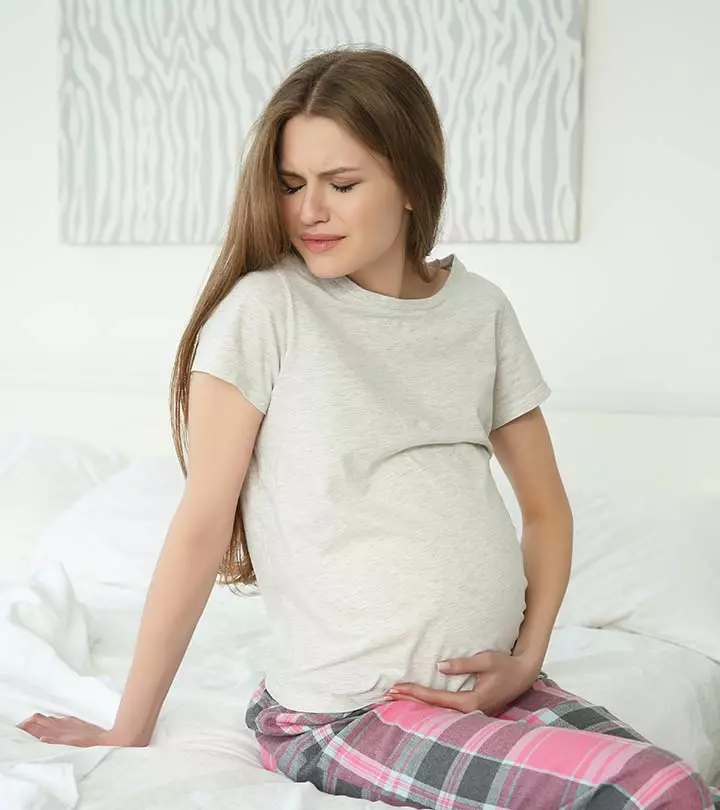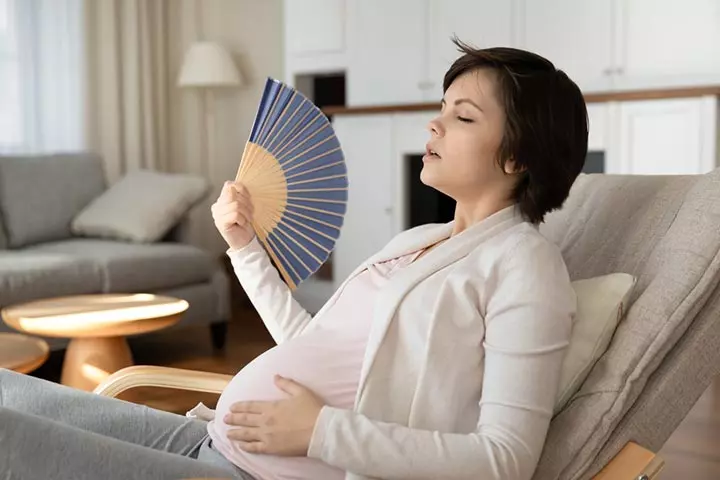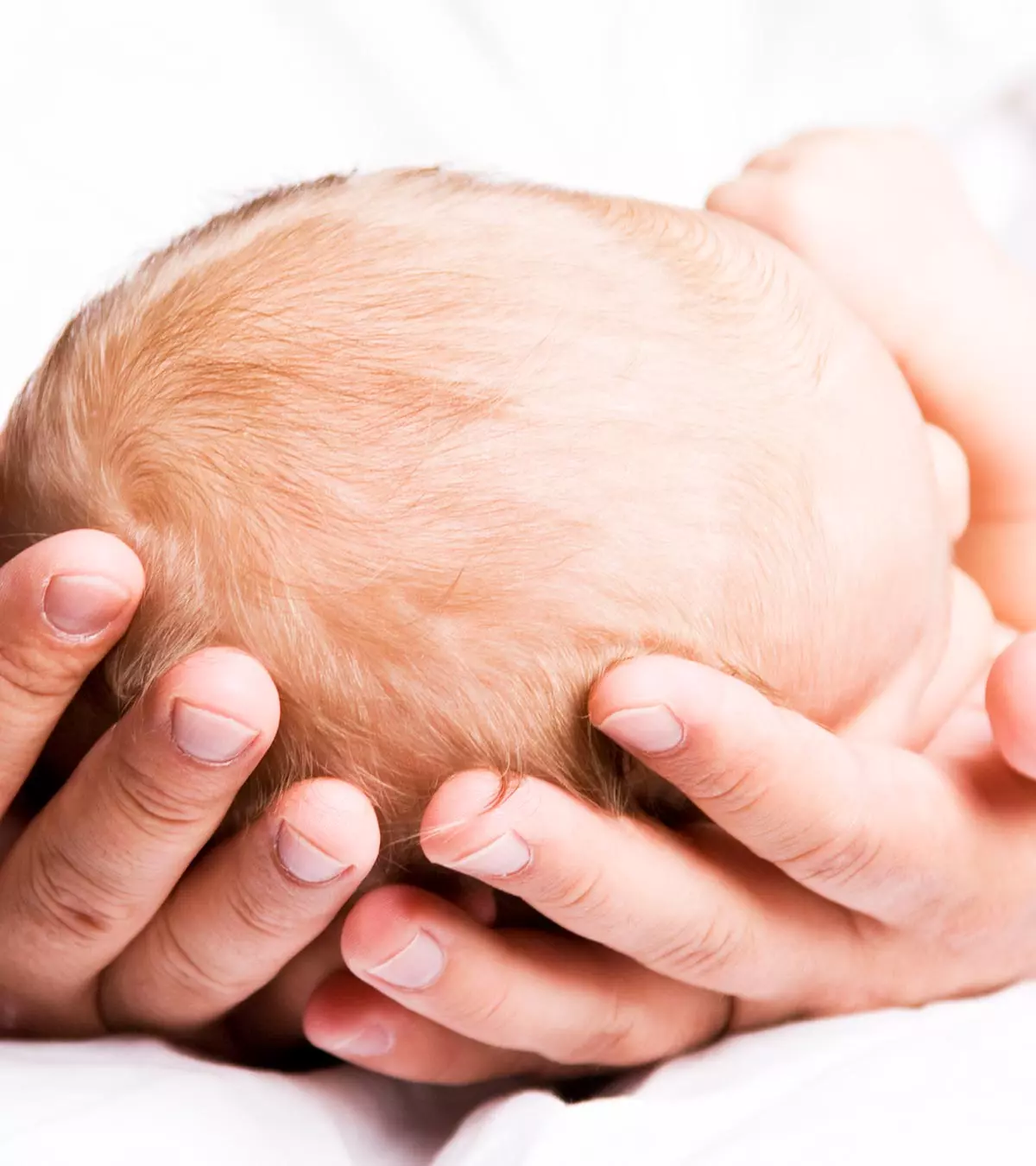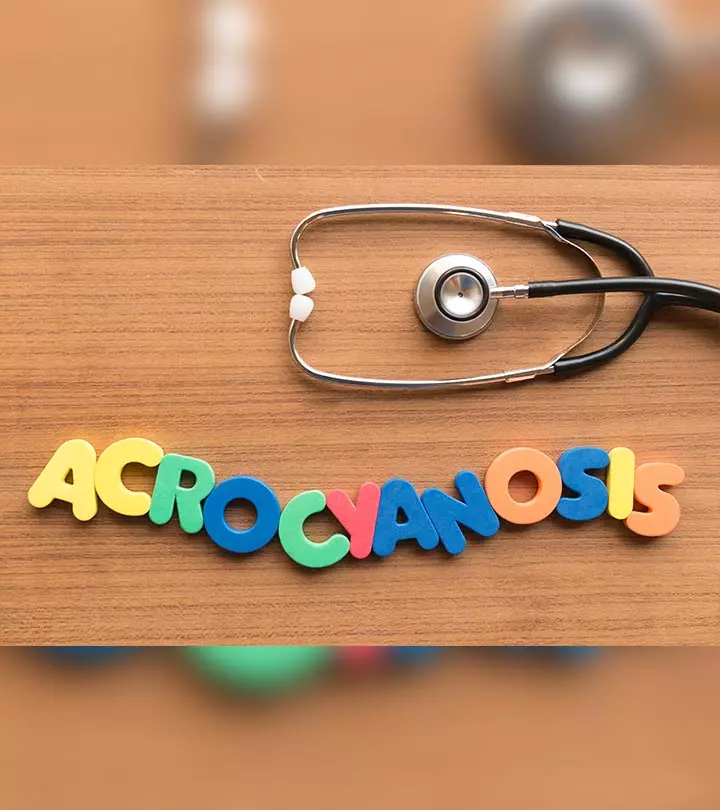
Image: Shutterstock
Stomach tightening is the feeling of tightness in the abdomen. You might have sharp, shooting pain on the sides of the lower belly when the uterus grows and the skin stretches with the progressing pregnancy. An expectant mother’s stomach may tighten at irregular intervals and relax within minutes. The tightening of the stomach is usually associated with the growing uterus and increasing weight and could be followed by Braxton Hicks contractionsi in the second and third trimesters. In this post, we tell you why stomach tightening happens in each trimester, and when you should see a doctor.

Key Pointers
- Stomach tightening during pregnancy is a common phenomenon where your tummy may tighten and relax at irregular intervals within minutes.
- The cause for stomach tightening varies from one trimester to other, and in most cases, the reason is not a matter of concern.
- Prompt medical guidance is essential to avert complications if the tightness gets longer and stronger.
- Taking a warm shower and sipping on a cup of hot water or milk cup are simple home remedies to relieve mild and irregular stomach tightening episodes.
Causes Of Tightness In Stomach During Pregnancy
There are various reasons for the tightening of the stomach, and they may vary from one trimester to the other.
During the first trimester

- Gas or constipation: Gas formation and constipationiA condition that makes it challenging to have a bowel movement leading to incomplete evacuation of hard, dry stools are common issues not only during early pregnancy but can be bothersome throughout the pregnancy. Both cause abdominal crampingiDiscomfort in the abdomen due to gas, bloating, or constipation. and could be painful (1).
 Quick fact
Quick fact- Miscarriage: In some cases, stomach tightening may indicate a miscarriage. However, this could be true only if the cramping comes along with the more indicative symptoms of miscarriage, such as vaginal bleeding, lower back pain, brownish or lumpy discharge, and absence of pregnancy symptoms (2) (15).
During the second trimester
- Stretching: Due to the hormonal changes in pregnancy and growth of the uterus, the abdominal muscles and ligaments are stretched, resulting in abdominal cramps or sharp and shooting pains along the abdomen (3). This is a common cause of abdominal pain during pregnancy.
- Round ligament pain: Round ligament is the structure that acts as a support to the uterus. Due to the growth of the uterus in the second trimester, this ligament gets stretched, leading to sudden, stabbing pain in your lower abdomen or groin area on one or both the sides. This pain could also feel like a tightening in the stomach with the change in your positions such as standing, sitting or bending (4).
 Quick fact
Quick fact- Braxton Hicks contractions: During the latter part of this trimester, you might have false labor or practice contractions. When these contractions occur, you can have a tightening and uncomfortable feeling in the abdomen. However, these contractions last for 30 to 60 seconds and are not as painful as the true labor contractions (5).
Dr. Ila Dayananda, board-certified obstetrician/gynecologist from Brooklyn, New York, says, “Braxton Hicks contractions are a normal occurrence throughout pregnancy. Depending on their nature, they can resemble stomach cramps or a tightening sensation. If you’re uncertain about what you’re experiencing, it’s advisable to consult your doctor to ensure your and your baby’s well-being.”

- Irritable uterus: In rare cases, you may experience frequent and regular contractions (or stomach tightening) that causes no changes in the cervixiThe lower end that forms the neck of the uterus. . They are similar to Braxton Hicks’ but could be stronger and do not respond to hydration or rest (6).
During the third trimester
Feeling tightness in your baby bump in the late pregnancy could be a sign of labor. Braxton Hicks contractions also become common as you progress through the third trimester. True contractions increase in strength and frequency over time (7). It is the time to keep a track of them and see your doctor.
Other Causes Of Stomach Tightening During Pregnancy
- Fetal movements: When your baby pushes or kicks, it might feel ticklish. Although you feel good about it, there is also a tightening feeling in the belly (8).

- Overconsumption: Overeating can make your pregnant belly feel tight and heavy. Along with accommodating the growing baby, a large meal can shrink the space in the belly (16).
The feeling of stomach tightness during pregnancy is mostly harmless as it is only for a few seconds to minutes and arises out of some regular pregnancy reasons. However, in some cases, you might have to see the doctor.
When Should You See A Doctor?
If the tightness gets stronger and longer or you have a high-risk pregnancy, you should check with your doctor. Also, the following situations will require medical assistance (7) (17):
- Experiencing tightness more than four times in an hour.
- Having any breathing difficulties along with the tightening of the abdomen.

- Having severe pain, bleeding per vaginum, water like or brownish discharge along with tightening.
- Perceiving less baby movements than usual.
If you do not have any serious problems with tightening but just a little abdominal discomfort, you can try some relaxation techniques to get relief.
How To Deal With Stomach Tightening?
If your stomach tightening and pain are mild and irregular, you can take the below measures (18).
- Change your position as some positions could trigger false contractions. Move your body or lie down to see if the tightening sensation goes away.
- Dehydration could sometimes trigger false contractions. Therefore, have water and take rest for some time.

- Take a warm shower (sitting in a hot water bath tub not advisable) as it helps relax the achy and tired muscles.
- If you are having a full bladder, then empty it to ease the pressure on the abdomen.
- Have a cup of warm tea or milk as it is hydrating and relaxing.
- Do not get up too quickly from your bed or any other position. Always take a lateral turniRotation along the long axis of a joint. before getting up from a lying down position.
- Try prenatal yoga poses and relaxation and mindfulness exercises to alleviate discomfort. Ensure you do these only if the tightening sensation is not severe.
If you find no relief after trying these home measures, check with your doctor. Also if you have not crossed 36th week, and have preterm labor signs such as increased pressure in the pelvis, bleeding and fluid discharge, go to the hospital. Your doctor will try to understand the cause for the tightening sensation and advise you accordingly.
Frequently Asked Questions
1. Is it safe to exercise when experiencing stomach tightening during pregnancy?
If stomach tightening is due to benign causes such as Braxton Hicks contractions, baby movements, or round ligament pain, exercising is likely safe. If the pregnancy is uncomplicated, physical activity does not increase the risk of miscarriage, low birth weight, or early delivery (11). However, practice exercises under expert supervision and discuss with your doctor if you are doubtful about why your stomach is tightening.
2. Is it normal to experience stomach tightening after sex during pregnancy?
Yes, it is normal to have low-intensity stomach cramps or contractions during pregnancy that may feel like stomach tightening during or after sex (12).
3. Can stomach tightening be a sign of placental abruption?
Placental abruption may cause stomach pain and uterine contractions (that do not relax) as symptoms. However, other symptoms usually accompany, such as vaginal bleeding, back pain, feeling faint, and decreased movements of the fetus (13).
4. Can stomach tightening be a sign of a uterine rupture during pregnancy?
Stomach tightening or uterine contractions (that do not resolve) may be a symptom of uterine rupture during pregnancy when present, along with other symptoms such as fast heart rate, low blood pressure, abdominal pain, vaginal bleeding, and abdominal pain (14).
Stomach tightening during pregnancy or a little discomfort of this kind is expected. However, you should not worry about it as it can all be brought into control once the cause is identified. At the same time, do not ignore any major changes or pains in your body. If you feel like more symptoms are making you feel uncomfortable, it is best to consult a medical professional at the earliest to get the care and attention you require. It is better to get clarity on what you are experiencing rather than waiting and assuming things that are not right.
Infographic: What Causes Stomach Tightening In Pregnancy?
Stomach tightening in pregnancy can be due to various reasons in each trimesteriA period of three months used as a division of pregnancy. . Some causes are normal, and a few can be due to conditions that can be managed with simple measures at home. Go through the infographic to learn common causes of stomach tightening in each trimester. Illustration: Momjunction Design Team
References
1. Abdominal pain; American Institute for Preventive Medicine
2. Miscarriage: The silent loss; North Carolina Women’s Hospital (2004)
3. Aches and pains during pregnancy; NIH (2012)
4. Sanoop Koshy Zachariah et al.; Management of acute abdomen in pregnancy: Current perspectives; Int J Womens Health (2019)
5. Deborah A. Raines and Danielle B. Cooper; Braxton Hicks contractions; StatPearls Publishing (2019)
6. JMichelle Brubaker; Ouch! Managing Labor Pains; UC San Diego Health (2018)
7. Am I in labor; NIH
8. Charlie C. Kilpatrick; Abdominal pain in early pregnancy; Agency for Healthcare Research and Quality
9. Pregnancy Gas;American Pregnancy Association
10. What you should know about round ligament pain; Kaiser Permanente
11. Exercise During Pregnancy; The American College of Obstetrics and Gynecologists
12. Women and sex during pregnancy; Raising Children Network
13. Placental Abruption; Cedars Sinai
14. Uterine Rupture; Cleveland Clinic
15. Miscarriage; Cleveland Clinic
16. Ate Too Much? 5 Ways to Ease a Tight, Bloated Stomach; University of Washington
17. Urgent Maternal Warning Signs; Texas Department of State Health Services
18. Pregnancy Discomforts; Cleveland Clinic
Community Experiences
Join the conversation and become a part of our nurturing community! Share your stories, experiences, and insights to connect with fellow parents.
Read full bio of Dr. Arpita Chakraborty
- Dr. Ila Dayananda, a board-certified obstetrician & gynecologist, most recently served as the chief medical officer for Planned Parenthood of Greater New York. She studied medicine and master's in Public Health at Northwestern University Medical School and then pursued an OB/GYN residency at the Beth Israel Deaconess Medical Center in Boston, MA. Dr. Dayananda holds a Family Planning Fellowship at Brigham and Women's Hospital/Harvard Medical School in Boston, MA.
 Dr. Ila Dayananda, a board-certified obstetrician & gynecologist, most recently served as the chief medical officer for Planned Parenthood of Greater New York. She studied medicine and master's in Public Health at Northwestern University Medical School and then pursued an OB/GYN residency at the Beth Israel Deaconess Medical Center in Boston, MA. Dr. Dayananda holds a Family Planning Fellowship at Brigham and Women's Hospital/Harvard Medical School in Boston, MA.
Dr. Ila Dayananda, a board-certified obstetrician & gynecologist, most recently served as the chief medical officer for Planned Parenthood of Greater New York. She studied medicine and master's in Public Health at Northwestern University Medical School and then pursued an OB/GYN residency at the Beth Israel Deaconess Medical Center in Boston, MA. Dr. Dayananda holds a Family Planning Fellowship at Brigham and Women's Hospital/Harvard Medical School in Boston, MA.
Read full bio of Rebecca Malachi
Read full bio of Dr. Ritika Shah
Read full bio of Reshmi Das

















